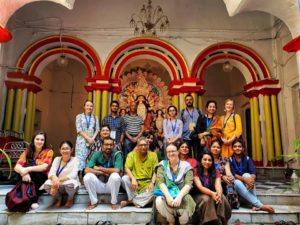Covid redefines heritage walks in Kolkata

Heritage Walk Calcutta at one of its walking tours to Bonedi Bari (aristocratic family homes) Puja in 2019 (Courtesy: Heritage Walk Calcutta)
As with other aspects of tourism, the coronavirus pandemic has also deeply impacted heritage walks in the country, with walk organisers adopting new norms and regulations.
Pathuriaghata and Jorasanko area, localities in north Kolkata, are famous not just for their traditional aristocratic Bengali bungalows but also for one of the largest and most well-known Durga Puja celebrations. Each year, thousands of tourists join in with hundreds of thousands of denizens of Kolkata to come and see the celebrations. It is also the time when dozens of enthusiasts of the rich history and heritage of the City of Joy gather together to participate in heritage walks that wind through several historical by-lanes of the city to rediscover its origins.
However, this year, due to the coronavirus pandemic, the Durga Puja celebrations may be held in entirely different manner and that could take a lot of fun out of the walks which, even if permitted at that time, would be done with a number of restraints and limitations. This possibility is making the organisers of the heritage walks rethink their strategy.
Heritage Walk Calcutta (HWC) is a company that specialises in organising such heritage walks for locals and tourists since 2017. This year, however, the company says it would be obliged to innovate in order to ‘enable its clients to experience the city in a new way and connect with diverse local communities’.
“We are going to approach Durga Puja very carefully this year. We generally conduct walks that visit some of the older household pujas in Calcutta, but this may not be possible this year, either because of the economic downturn and pandemic that will probably result in a muted celebration this year or because the families are not comfortable with having outsiders enter their home because of the risk of contamination. As always, we will work with the family members to determine what is or is not possible this year. If walking tours are not possible, we will consider the possibility of digital alternatives,” Chelsea McGill, co-founder and chief innovation leader of HWC tells Media India Group.
The safety concerns
One of the biggest challenges this year for companies like Heritage Walk Calcutta would be to organise walks once people start travelling. “We are constantly keeping updated about containment zones in the city and will only do the tours that do not pass through containment zones. Apart from that, we will try to avoid going into any structures unless we can be sure that there will be enough space and airflow to reduce the chances of contamination. We will also carefully ascertain the local community’s wishes in regards to taking tour groups to their area, and will abide by any restrictions that are required in this difficult time,” says McGill.
Besides the restrictions imposed by the authorities and local communities, the heritage walk organisers would also bring in some changes to the way they conduct these walks. “We have decided to limit the number of walk participants to six people, rather than 17. All participants will be required to wear masks at all times, as will all team members, and to stay at least a metre apart from each other, as recommended by the WHO guidelines,” she adds.
It is not just in the future that the company would feel the pandemic’s impact. The lockdown and a subsequent collapse of tourism and travel all over the world has already hurt Heritage Walk Calcutta as it has hit thousands of other travel-related businesses. The firm says it tried to use the digital technology and some innovative approaches in order to continue the engagement with its clients.
“Obviously, the pandemic has prevented us from running tours, which has significantly reduced our income. We have tried to be creative in finding new ways to deal with this, such as by hosting online workshops for non-experts that teach various kinds of research methodologies. Other than that, we have used this time to think about future offerings and do research to prepare for when we can start tours again. We have been hosting live sessions on Facebook where we interview other people from all over the world about what they are doing to increase heritage awareness or outreach. This includes some walking tour providers, as well as others who are doing good work in the heritage sector. And again we are also conducting online workshops to continue our heritage outreach while everyone is stuck at home” she concludes.









